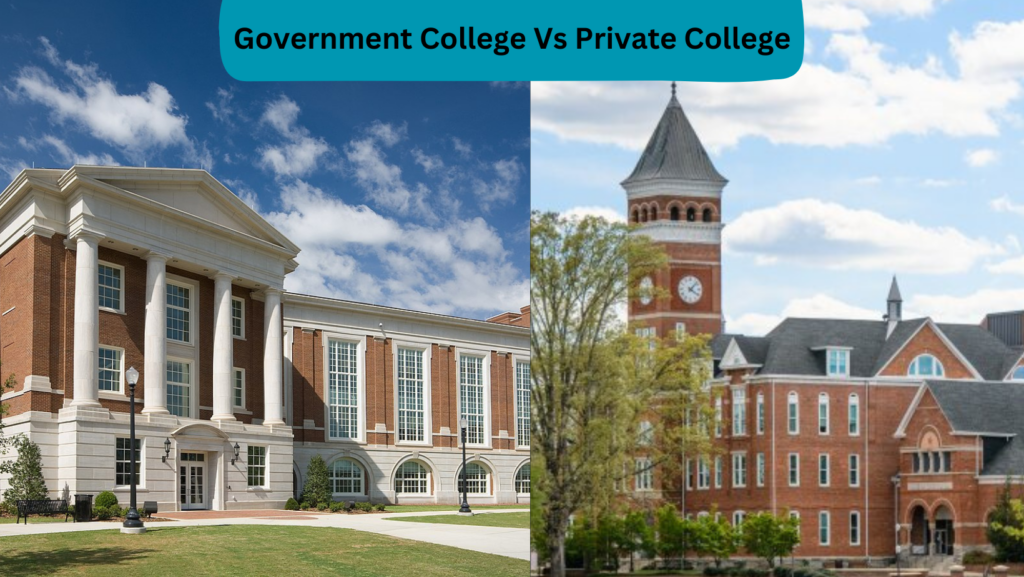At the crossroads of higher education, a perplexing choice beckons: government college Vs private college, which is better? This decision encapsulates a myriad of considerations, from academic quality to financial implications.
In this exploration, we unravel the burstiness and intricacies of both options, helping you make an informed choice that aligns with your aspirations and circumstances. Join us on this journey as we delve into the pros and cons of government and private colleges, navigating the terrain of education with clarity and insight.
Contents
- 1 The Essence of Government Colleges
- 2 The Essence of Private Colleges
- 3 Choosing the Path: Government or Private?
- 4 Conclusion: Government College Vs Private College
- 5 FAQs: Unraveling the Decision
- 5.1 Q1. Are government colleges always more affordable than private colleges?
- 5.2 Q2. Do private colleges offer better academic quality?
- 5.3 Q3. Which colleges have better placement opportunities?
- 5.4 Q4. Can I get scholarships in both government and private colleges?
- 5.5 Q5. How important is the college’s reputation in the job market?
The Essence of Government Colleges
Understanding Government Colleges
Government colleges, nourished by the resources of the public, stand as the embodiment of education’s accessibility for the masses. These institutions are emblematic of inclusivity, housing an expansive array of disciplines and providing a generous number of seats for students yearning for quality education without the weighty burden of exorbitant fees.
Much like the thriving ecosystems of community gardens, government colleges foster the growth of knowledge in a fertile environment designed to serve a diverse cross-section of society. Just as a garden’s bounty nurtures the community, these colleges cultivate intellectual abundance, facilitating the growth of minds from all walks of life.
The Burstiness of Affordability
The burstiness of affordability is a remarkable hallmark of government colleges, standing as a testament to their unwavering dedication to democratizing education. This distinct feature reverberates with a resounding commitment to opening the doors of learning to a diverse spectrum of individuals.
Bursting forth with opportunities, these institutions extend a welcoming embrace to students from myriad socio-economic backgrounds, effectively flattening the terrain of education. In this inclusive realm, financial constraints are stripped of their power to hinder intellectual growth, fostering an environment where knowledge and potential flourish without impediment.
Quality vs. Quantity
Quality vs. Quantity: a juxtaposition that often casts a shadow of uncertainty over the realm of government colleges. While these institutions boast a multitude of seats, concerns regarding academic quality frequently emerge. The burstiness of student intake can occasionally give rise to hurdles in sustaining individualized attention and robust infrastructure.
Opting for a government college might evoke the sensation of navigating a bustling marketplace, where the allocation of resources is shared among a multitude. Much like a grand bazaar, government colleges exude an air of vibrancy, yet the challenge lies in harmonizing this vitality with the pursuit of excellence in education, where individual growth is not compromised amid the crowd.
The Essence of Private Colleges
Exploring Private Colleges
Embarking on a journey through the realm of education, we encounter private colleges—a domain marked by independence and autonomy. These institutions stand as boutique hubs of learning, akin to finely curated treasures. Within their walls, a treasure trove of specialized programs and distinct approaches to education awaits, much like a collection of rare gems.
With their sustenance drawn from tuition fees and donations, private colleges craft a unique learning experience. Picture them as artisanal workshops, meticulously fashioning tailored educational journeys. Just as skilled artisans imbue each creation with personal touch, private colleges infuse their programs with a touch of individuality, carving pathways that resonate with the unique aspirations of each student.
The Burstiness of Specialization
Within the landscape of private colleges, the burstiness of specialization emerges as a defining attribute. These institutions are fueled by a dynamic drive towards specialization, much like a forge that hones metals into precision instruments.
Bursting with vigor, private colleges craft programs meticulously aligned with the ever-evolving demands of industries, offering students a distinctive edge in the competitive job market. This phenomenon is akin to a skilled artisan meticulously creating custom pieces that not only showcase craftsmanship but also fulfill specific needs. Similarly, private colleges sculpt educational programs that cater to specific skill sets, ensuring graduates are equipped with the exact tools they need to step confidently into their professional endeavors.
Cost: The Elephant in the Room
Addressing the proverbial elephant in the room, the cost factor looms large when considering private colleges. While these institutions are renowned for their targeted educational approach, the burstiness of cost can cast a shadow of concern. Tuition fees within the realm of private colleges often surpass those of their government counterparts.
This financial aspect is akin to a decision between acquiring a bespoke suit, meticulously tailored to one’s specifications, and opting for an off-the-rack outfit. The former promises unparalleled perfection tailored to individual preferences but accompanies a premium price tag. Similarly, private colleges offer a customized educational experience, yet this level of specialization comes at a financial investment that requires careful contemplation.
Choosing the Path: Government or Private?
Standing at the crossroads of education, the decision between government and private colleges is a moment of choice brimming with possibilities. Both paths beckon with their unique merits and challenges, offering a tapestry of experiences waiting to be woven.
Government colleges burst forth with the vibrant hues of affordability and inclusivity, much like a grand carnival that invites all to partake in the festivities of learning. On the other hand, private colleges burst with the brilliance of specialization, akin to an artisan’s workshop where each stroke of craftsmanship results in a unique masterpiece.
Conclusion: Government College Vs Private College
The choice between a government college vs private college hinges on a myriad of factors—financial considerations, academic preferences, and career goals. Burstiness defines both paths, manifesting in diverse ways. The decision is ultimately a tapestry woven from your individual aspirations and circumstances, aiming to create an educational experience that aligns with your values and dreams.
FAQs: Unraveling the Decision
Q1. Are government colleges always more affordable than private colleges?
Government colleges tend to have lower tuition fees due to public funding, making them more affordable for many students.
Q2. Do private colleges offer better academic quality?
Private colleges often offer specialized programs and more personalized attention, but academic quality can vary widely. It’s essential to research each institution.
Q3. Which colleges have better placement opportunities?
Placement opportunities depend on various factors, including the college’s reputation, industry connections, and the students’ skills. Both government and private colleges can offer strong placement support.
Q4. Can I get scholarships in both government and private colleges?
Scholarships are available in both types of colleges, but they may have different criteria and availability. Check with individual institutions for scholarship opportunities.
Q5. How important is the college’s reputation in the job market?
The college’s reputation can influence job opportunities to some extent, but your skills, experiences, and networking efforts also play a significant role. A well-rounded education and practical skills are valuable regardless of the college’s status.






